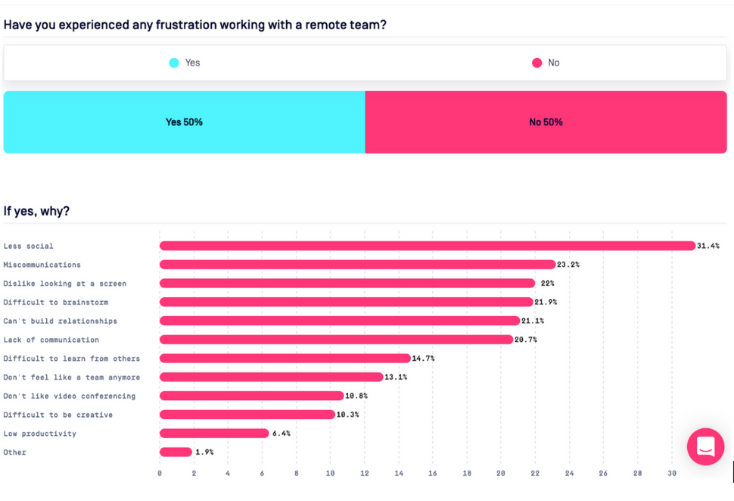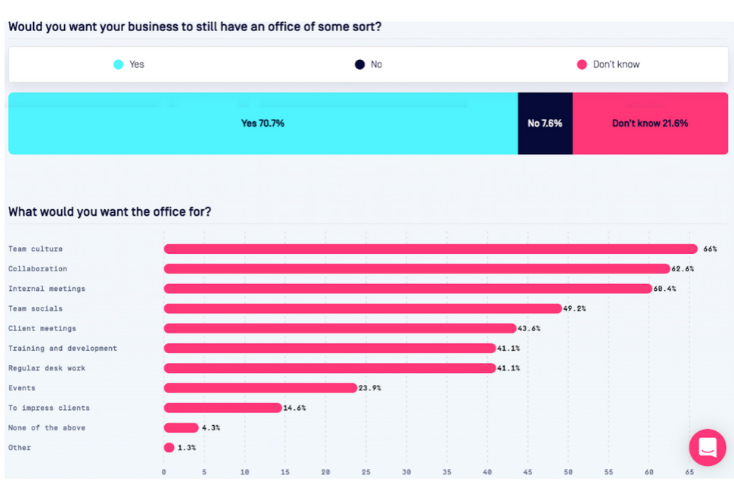- A survey of 1,000 office workers by HubbleHQ aimed to answer the question: ‘Should we ditch the office?’
- The majority of respondents believe we should keep the office, but with greater work flexibility.
- The office is valued as a place to bring people together and encourage greater culture and team collaboration.
HubbleHQ recently surveyed over 1,000 employees from businesses of different shapes, sizes and sectors in a bid to answer the following question:
“Should we ditch the office?”
If you work in the office space industry you’ll be relieved to hear that the answer is a resounding “no”. However, the office as everyone knows it is destined for a transformation.
You can read the survey results in full at HubbleHQ. In the meantime, let’s take a look at some of its key takeaways.
Ways of Working Before COVID-19
Prior to the pandemic, only 5% of the survey’s respondents worked from home full-time and most did so infrequently — just one or two days a week.
Similarly, hardly anyone worked somewhere that wasn’t their home or company’s office space. The survey reveals that only 24% of people worked in an environment that wasn’t their home or office (such as a cafe or during the commute) more than once a month.
In terms of time spent commuting to the office, 45% travelled between 30 minutes to an hour to get to the office and 20% travelled over an hour each way. Bear in mind that HubbleHQ is UK-based and around 70% of respondents have an office in London.
Before the pandemic, two-thirds of employees had an assigned desk, with just 13% using hot desks within their office.
Working from Home During COVID-19
Positives:
- 70% of respondents reported a positive experience of working from home.
- 61% of respondents said their views on WFH changed (92% for the better).
- 79% cited “no commute” as their favorite thing about working from home, followed by financial savings (55%), more time with loved ones (42%), improved focus/ productivity (28%) and environmental impact (16%).
Negatives:
- 75% of respondents missed the social interaction element of the office environment.
- 34% struggled to maintain a work-life balance when working from home, with 24% finding the home environment too distracting.
- There were also concerns about the impact of WFH on both physical and mental health and communication between and within teams.
- Interestingly, 50% of respondents experienced frustration when working in a remote team.
- Things people miss most about their office include meeting rooms (45%), local restaurants and bars (43%) and events and talks (29%).

Aspirations for Working in the Future
There’s a huge appetite for a hybrid/ flexible approach moving forward, with 86% wanting to work outside of the office environment at least one day a week but only 15% wanting to do so on a full-time basis. The majority would like to WFH when remote working (79%), while 42% would like to work from a coworking space that’s separate from their main office.
Surprisingly, 42% also say they would like to work “abroad”.
- 35% want to be able to work in different places on different days (with 34% wanting to work in the same location most days).
- 25% would like to utilise a coworking space once or twice a week as long as their employer pays for it, with 25% wanting to use one occasionally.
- 84% would like to have the option to use a meeting space outside of their main office, mostly on a flexible basis when needed.
When asked what would make the WFH experience better, 55% said an ergonomic chair, 30% said a dual monitor and 24% said faster WiFi. Other desirables include a standing desk, food allowance, garden office, childcare and noise cancelling headphones.
These findings in particular provide some food for thought, especially as we expect to see laws and regulations come into play around how employers make home workspaces safe and possibly how they contribute to rent/ mortgage and utilities costs.
Despite the positive attitudes towards WFH, 71% of respondents want access to an office in one form or another.
HubbleHQ notes that many companies are considering hot desking as a way to decrease their office footprint. Yet with 42% voicing concerns over hot desking and hygiene, it’s worth checking in with teams first.
Another option is office time-sharing whereby companies share space on a rota basis, however 26% said they wouldn’t feel comfortable sharing their space with another company due to accessibility, confidentiality, cleanliness and security.

Ultimately, in the words of HubbleHQ, the office’s “main competitor is now the home. Your product must be a good enough reason to leave home, therefore, best-in-class for collaboration and/or quiet work — and worth paying good money for.”

















